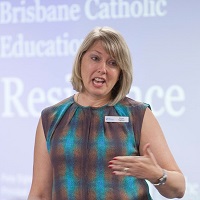As we start the new school year, we hope that many of our students, teachers and school leaders will be feeling refreshed and re-energised. Yet even though we are just a few short weeks into the school year, many teachers and principals may already be struggling with the sheer volume of administration, student behavioural challenges, demanding parents, and/or staffroom politics.
Due to their nature, schools are extremely busy and ever-changing places, which can at times lead to stressful situations. Dr Philip Riley, from the Australian Catholic University, leads a long-term survey on principal health and wellbeing. You can read the entire report here. Though his research focuses on principals, the results have also resonated with teachers and educators.
Dr Riley says, “Our latest findings again reveal that principals are unable to cope with escalating workloads, leading to health problems such as sleeplessness, anxiety and burnout.”
To support our schools, Dr Riley makes the following key recommendations for education professionals and the sector more broadly:
- Adopt a whole-of-government approach to education budgets
- Reduce job demands or increase resources to help educators cope with increased workloads
- Work towards building trust in the system as a whole, and between those who work in it
- Encourage local community support for local schools to reduce offensive behaviour
- Allow educators to respectfully speak back when faced with moral harassment, and to take responsibility for personal work-life balance.
Dr Stephen Brown, CEO, Queensland Education Leadership Institute (QELi), understands the enormous pressure our schools are under.
“Dr Riley’s research uncovers an ongoing trend that needs attention from the wider system, local school and parent communities, and our educators themselves. While there are identified areas that will need time and resources to make a difference, there are other steps that can start to address this growing issue now,” Dr Brown said.
“One of QELi’s signature programs, run in partnership with The Resilience Institute, is our one-day Practical Resilience workshop. In 2015, we delivered 12 Practical Resilience programs for 276 educators and school leaders of all levels, from Darwin to Toowoomba.
“The message is clear, our school leaders are under enormous pressure and desperately need strategies that help to re-balance their health and wellbeing.”
So how can principals, school leaders and all education staff start to take back control and invest in themselves, to work hard, play hard and recover hard in 2016?
Peta Sigley, a Principal at The Resilience Institute, and facilitator of QELi’s Practical Resilience program shares some helpful advice.
“We want to support our educators so they stay in the sector as happy, fulfilled and enthusiastic teachers. They are, after all, the ones who are able to embed many of these fundamental life-skills and concepts of resilience within our children.
When helping individuals or organisations, Peta focuses on the following key areas. Ask yourself how you are feeling.
- Physical wellbeing: Do I prioritise my physical needs? What choices am I making in terms of sleep, exercise and diet? Are poor choices compounding to reduce my energy and contribute to my negative mood?
- Stress management: Is life about just coping? How do I make the shift from this negative space to engagement, enthusiasm and setting myself up for peak performances, more sustainable throughout my day?
- Resilience emotions: What positive and functional emotions are driving me towards advantage? How am I influencing relationships positively? What choices am I making, or are my emotions just happening to me with no level of awareness or choice?
- Emotional intelligence: How do I go about choosing my thoughts? Am I making negative biases and closing off opportunities?
- Spirit in action: What makes me get out of bed each day? What do I do every day to invest in this space?
Dr Brown says, “School leaders need to be proactive about their own health and wellbeing, just as they would look out for their students. It is a matter of prioritising and choosing to invest time and energy in things that will be of benefit in the long-term, even when that means taking a break, reflecting and relaxing.”
Dr Riley adds, “While there are some quite disturbing trends in the Principal Health and Wellbeing Survey, there are some positive ones as well, specifically, about the need and opportunity we have to build professional capacity in schools, for the benefit of our educators, schools and students.
“Our education system is based on the goodwill of people. I understand the resourcing issues, and other limitations. But, as long as our education leaders are committed and have aligned values, the future of the school system will look very rosy.”
Dr Stephen Brown Peta Sigley
About QELi and The Resilience Institute
Established as a not-for-profit organisation in June 2010, QELi helps develop education leaders to improve student outcomes. Attracting participants from across Australia and the world, it is a partnership between the Queensland Department of Education and Training, Queensland Catholic Education Commission and Independent Schools Queensland.
The Resilience Institute provides an evidence-based, integral and practical solution at a strategic, leadership and staff level. Having trained over 30,000 people in over 10 countries we understand how to engage your people and your organisation. We are experts at building RESILIENCE—using a well-tested methodology to develop physical, emotional and cognitive skills.
QELi and The Resilience Institute have developed the one-day Practical Resilience program that provides an integrated approach to building resilience that outlines practical skills to help people get back to being calm, present, engaged and energised across all domains of their life, such that it doesn’t really matter what comes their way—they are able to cope.
Each of the programs is customised to meet specific school, sector or regions’ needs. Participants receive evidence-based research and tools, to develop and solidify support structures.
For further information: www.qeli.qld.edu.au


